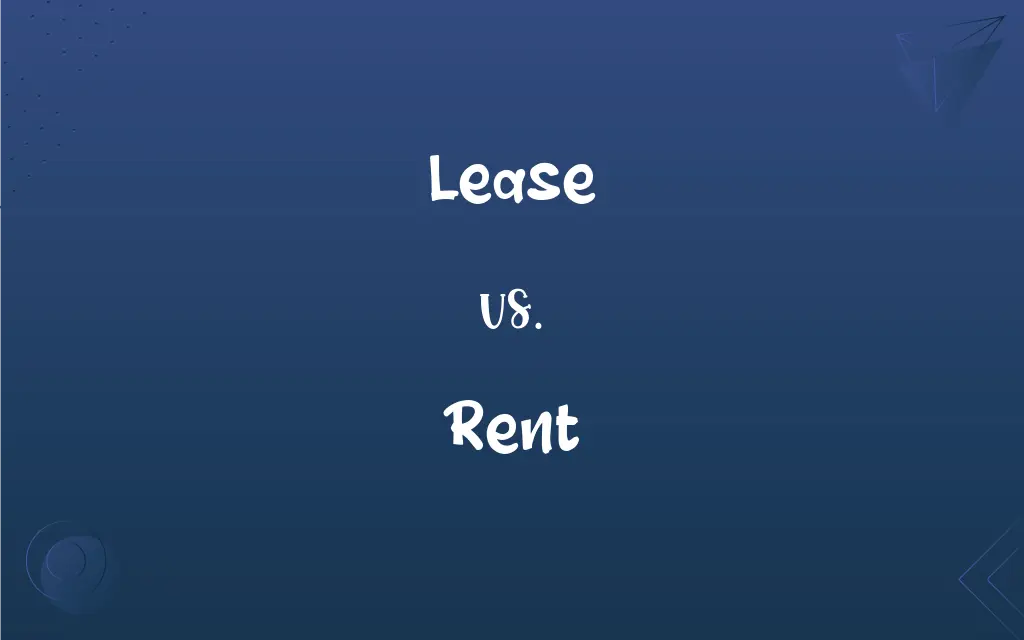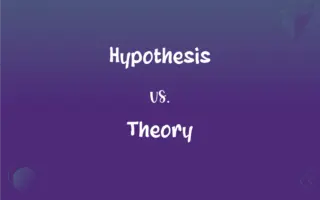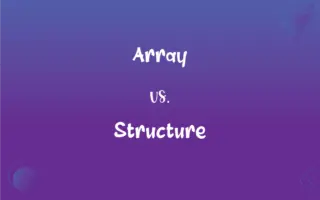Lease vs. Rent: What's the Difference?
Edited by Janet White || By Harlon Moss || Updated on October 17, 2023
"Lease" refers to a contract granting use or occupation of property for a specific period, while "rent" is the payment made under the terms of such a contract.

Key Differences
"Lease" and "rent" are terms often used interchangeably in the real estate world, but they have specific meanings and implications. A "lease" is a contractual agreement that allows one party, the lessee, to use and occupy a property owned by another party, the lessor, for a specified period. This duration and other terms are stipulated in the lease agreement.
On the other hand, "rent" typically refers to the periodic payment made by the lessee to the lessor in exchange for the right to occupy and use the property. While a lease is the overall agreement, rent is one of its primary components. People often say they "rent" a property when, technically, they are leasing it and paying rent for its use.
Furthermore, the term "lease" implies a longer commitment, often spanning months or years. For example, many apartment leases are for one year. Conversely, "rent" can be more flexible, potentially applying to shorter durations, such as weekly or monthly terms. However, the delineation is not always clear-cut, and cultural or regional differences may affect usage.
Lastly, it's worth noting that both "lease" and "rent" can be used as nouns and verbs. For instance, one might "lease" (verb) a property or sign a "lease" (noun). Similarly, a tenant might "rent" (verb) an apartment or pay the "rent" (noun) every month.
Comparison Chart
Nature
Contractual agreement
Periodic payment or short-term agreement
ADVERTISEMENT
Duration
Typically longer (e.g., annually)
Can be shorter (e.g., monthly, weekly)
Part of Speech
Can be both a noun and a verb
Can be both a noun and a verb
Commitment
More binding, based on contract terms
Might offer more flexibility
Associated with
Both residential and commercial properties
Primarily associated with residential spaces
Lease and Rent Definitions
Lease
Lease can also refer to equipment or vehicles.
I took out a lease on a new car.
ADVERTISEMENT
Rent
Rent can be adjusted based on agreements.
The landlord raised the rent after a year.
Lease
Lease involves stipulated terms and conditions.
The lease prohibits pets in the building.
Rent
Rent can signify the act of using property for a fee.
They decided to rent a cabin for the weekend.
Lease
Lease may come with an option to purchase.
The lease has an option to buy the property at the end.
Rent
Rent is a periodic payment for property use.
The rent for the studio is $1,200 per month.
Lease
Lease can denote the act of granting property use.
The company will lease the entire building to a single tenant.
Rent
Rent can be applied to equipment or goods.
I'll rent a camera for the event.
Lease
Lease is a contractual agreement for property use.
I signed a two-year lease for the apartment.
Rent
Rent might not require long-term commitments.
We'll rent the place month-to-month.
Rent
Payment, usually of an amount fixed by contract, made by a tenant at specified intervals in return for the right to occupy or use the property of another.
Rent
A similar payment made for the use of a facility, equipment, or service provided by another.
FAQs
Is "renting" a short-term action?
Renting can be short-term, but it depends on the agreement's terms.
Can "lease" be used as a verb?
Yes, "to lease" can mean to grant or secure property through a contractual agreement.
Do all leases require rent payments?
Most leases involve rent, but terms and payment amounts can vary.
a lease or rent?
A lease, being a formal contract, typically involves more binding terms than simple rent.
Is a lease always long-term?
While leases often indicate longer terms, short-term leases also exist.
What's a lease agreement?
A lease agreement is a formal document outlining the terms between lessor and lessee.
Can I negotiate my rent?
Yes, rent can often be negotiated before signing a lease.
Is a "lease" the same as "rent"?
No, a lease is a contractual agreement, while rent is a periodic payment or short-term use.
Is there any legal protection for renters and lessees?
Yes, many jurisdictions have laws protecting renters and lessees' rights.
Why would someone choose to rent over leasing?
Renting can offer more flexibility and shorter commitment than a lease.
Can both terms apply to equipment or vehicles?
Yes, both equipment and vehicles can be leased or rented.
What happens if I break a lease?
Breaking a lease might result in penalties, often stipulated in the agreement.
Do I get my deposit back after my lease ends?
Typically, if the property is in good condition and terms are met, deposits are returned.
Is it possible to sublease a property?
Depending on the lease terms, subleasing might be possible.
Can rent prices change during a lease?
Rent typically remains fixed during a lease, unless the lease specifies adjustments.
What's the difference between a lessor and a lessee?
The lessor owns the property, while the lessee uses the property based on the lease terms.
Do businesses lease or rent their spaces?
Businesses can either lease or rent, but many opt for leases to secure longer-term locations.
How do rent-to-own agreements work?
Rent-to-own involves renting property with an option to purchase after a specified period.
Do you need to renew a lease?
Depending on its terms, a lease might require renewal after expiration.
Is "rent" always monthly?
While common, rent can also be weekly, annually, or based on other terms.
About Author
Written by
Harlon MossHarlon is a seasoned quality moderator and accomplished content writer for Difference Wiki. An alumnus of the prestigious University of California, he earned his degree in Computer Science. Leveraging his academic background, Harlon brings a meticulous and informed perspective to his work, ensuring content accuracy and excellence.
Edited by
Janet WhiteJanet White has been an esteemed writer and blogger for Difference Wiki. Holding a Master's degree in Science and Medical Journalism from the prestigious Boston University, she has consistently demonstrated her expertise and passion for her field. When she's not immersed in her work, Janet relishes her time exercising, delving into a good book, and cherishing moments with friends and family.































































